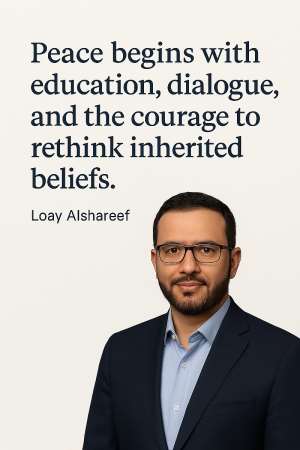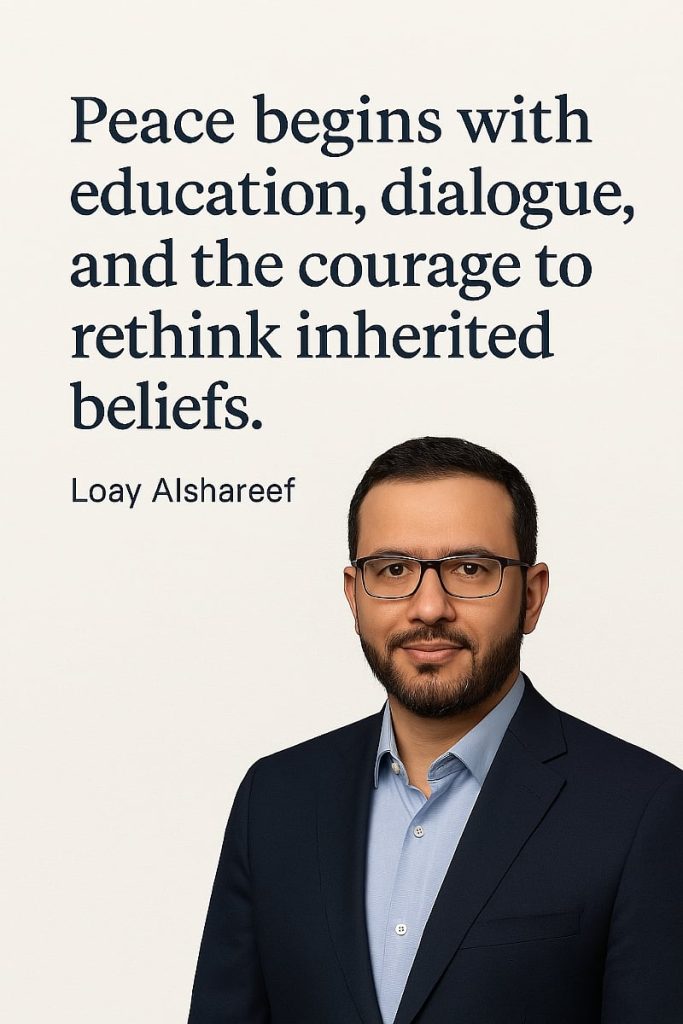
1. 🌱 Early Life: A Childhood Shaped by Dogma
Born in 1982 in Jeddah, Saudi Arabia, to an Egyptian father, Loay Alshareef was raised in a devout Muslim household steeped in Salafi orthodoxy. By 18, he had memorized the Qur’an, but his education was laced with antisemitic tropes and rigid interpretations of Islamic texts. Like many in his generation, he was taught that Jews and Christians were adversaries of the faith—a belief reinforced by cultural narratives and religious instruction.
His worldview began to unravel in his twenties when he traveled to Paris to study French. Assigned to live with a Yemenite Jewish host family, Alshareef was initially repulsed by the Star of David in their home. He even requested to be relocated. But over time, shared meals, Shabbat rituals, and candid conversations with his hosts dismantled his prejudices. “I entered their home with fear,” he later recalled, “but I left with family.” That year in Paris became the crucible of his transformation—from religious absolutism to interfaith advocacy.
2. 🌍 Bridging Worlds: A Voice Resonating Across Cultures
Alshareef’s message of reconciliation now echoes across both Arab and Western spheres, challenging entrenched narratives and offering a model of coexistence rooted in shared humanity.
In the Arab world, particularly in the UAE where he resides, Alshareef has become a prominent voice for normalization with Israel. He supports the Abraham Accords and frequently participates in interfaith events that bring together Muslims, Jews, and Christians. His fluency in Arabic, Hebrew, and English allows him to engage diverse audiences with cultural nuance and theological depth. In Western contexts, Alshareef has toured U.S. college campuses, confronting misinformation about the Israeli-Palestinian conflict and offering a native Arab perspective that defies stereotypes. He emphasizes that peace is not a Western export but a regional imperative. “We are the children of Abraham,” he tells students. “Our destinies are intertwined.”
His digital presence—particularly on Instagram and X (formerly Twitter)—has become a platform for educational content on Semitic languages, Jewish-Muslim history, and the moral imperative of peace. His posts often include Arabic subtitles, signaling his commitment to reaching audiences in the Arab world who may still be grappling with the ideologies he once embraced.
3. 🕊️ Peacebuilding in Practice: Initiatives and Impact
Alshareef’s advocacy is not confined to rhetoric. He has launched and supported several initiatives aimed at fostering understanding and dismantling hate:
Educational Media: Since 2012, he has produced YouTube series and social media content exploring the linguistic and cultural intersections of Judaism and Islam. His work demystifies Jewish traditions for Arab audiences and vice versa. Interfaith Gatherings: In Abu Dhabi, he organizes joint celebrations of Jewish and Muslim holidays, creating safe spaces for dialogue and cultural exchange. These events have drawn praise from religious leaders across faiths, including Chief Rabbi Levi Duchman of the UAE. Public Diplomacy: Alshareef has spoken at forums hosted by StandWithUs, the Z3 Project, and other peace-focused organizations. He has met with diplomats, religious scholars, and civil society leaders to advocate for a new paradigm of Middle East engagement—one rooted in mutual respect rather than zero-sum politics. Theological Reframing: Perhaps most provocatively, Alshareef argues that Zionism—the belief in Jewish self-determination in their ancestral homeland—is not antithetical to Islam. He cites Qur’anic references to Jewish prophets and the land of Israel, challenging Muslims to revisit their own texts with intellectual honesty.
🇬🇭 Why This Matters to Ghana
In a world increasingly polarized by identity politics and historical grievances, Alshareef’s journey offers a compelling case study in moral courage and intellectual evolution. For Ghana—a nation that prides itself on religious tolerance and Pan-African solidarity—his story underscores the power of education, empathy, and dialogue in healing fractured societies.
As Ghana navigates its own challenges around interfaith coexistence, political polarization, and global diplomacy, voices like Alshareef’s remind us that peace is not the absence of conflict, but the presence of understanding.
Retired Senior Citizen
Teshie-Nungua
[email protected]


